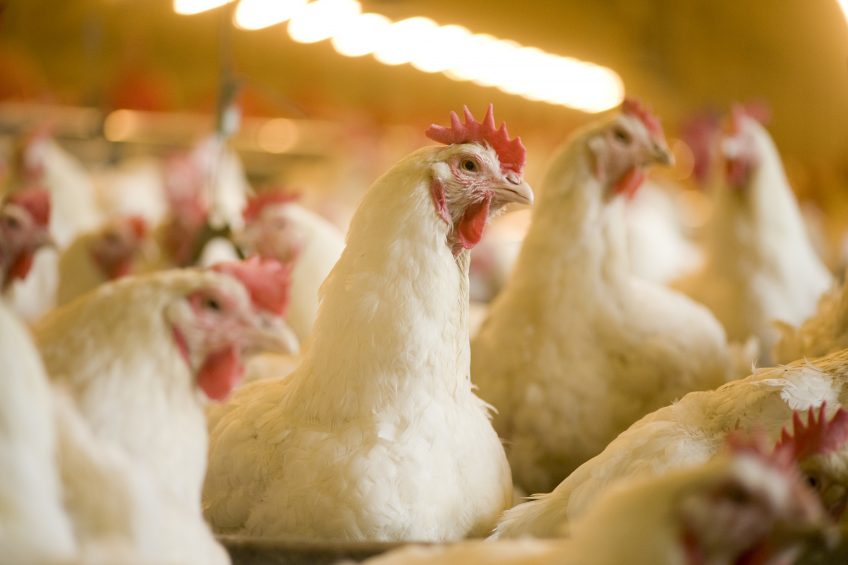The impact of bacterial biomass and endogenous protein loss

Modern poultry breeds require diets that provide for rapid muscle development. Because of the extraordinary growth rates of today’s birds, even small deficits in amino acids can have severe consequences.
Increasingly, we recognise that endogenous protein loss, or protein loss that is non-dietary in origin, plays an important role in this process. Endogenous protein loss refers to any protein, peptide, or amino acid of non-dietary origin that exits the terminal ileum.
Source and significance
A considerable amount of endogenous protein is secreted into the gut during the digestive process. These proteins vary in amino acid composition, origin and in their ability to be broken down. Important endogenous sources include mucin, bile, sloughed epithelial cells and digestive enzymes. Amino acid losses attributed to these sources can be as much as 10-15 gram/kg of dry matter intake, or 1-4 grams per gram of ingested protein.
The dominant amino acids in endogenous proteins include glycine, threonine, and glutamic acid. While 75-90% of these amino acids are recovered before they leave the terminal ileum, a portion exits the ileum at a significant metabolic cost in terms of both amino acids per se and net energy. Experiments show that losses can range from 2892 kcal/kg for aspartic acid to 6740 kcal/kg for phenylalanine. Therefore, factors that affect the endogenous protein flow will also have an important bearing on digestible energy.
Microbial biomass and endogenous protein loss
Microbial biomass or protein is a peculiarity because it is neither dietary nor endogenous. Microbial protein represents a confounding ‘sink’ of amino acids that can undergo substantial alteration in composition caused by bacterial metabolic processes, including conversion of non-protein N to protein-N.
Some researchers advocate a separation of microbial protein from other endogenous protein. This is because over 60% of protein in the ileum comes from bacterial biomass, the remainder being mucin, sloughed animal cells, and digestive enzymes. Furthermore, the amino acid composition of bacterial protein differs markedly from that of mucin or bile. Both mucin and bile proteins are dominated by threonine, serine, glycine, proline, and cystine. Amino acids prominent in bacterial sources include glutamic acid, aspartic acid, and leucine (Table 1).
Glutamic acid benefits gut energy partitioning and nutrient absorption, while leucine has positive ramifications on protein accretion. Changes in the recovery of these different sources of endogenous protein have important implications in animal nutrition.

Peptidoglycans can be relevant biomass
Dead cells and cell wall fragments, also known as intestinal ‘rubbish’, constitute the main source of bacterial biomass. Nearly 60% of fecal mass is bacterial and approximately 30-35% of that is dead or non-viable. The great majority of these bacteria (almost 75%) are Gram-positive. As much as 90% of the cell wall in Gram-positive bacteria is comprised of peptidoglycan (PGN). PGN is a massive polymer of amino acids (eg, peptido-) and sugars (eg,-glycan) unique to bacteria.
The protein from PGN differs considerably across bacterial species, and contains a mixture of D and L forms of amino acids. Not all D isomers can be utilised nutritionally. That said, the quantity of this rubbish may have a greater negative impact on performance than the presence of the D isomers. This is because fragments of dead bacteria could physically impair normal enzyme-substrate link-ups.
Implications and conclusions
Excess endogenous protein loss can be lowered with additives like feed enzymes, and with ingredient treatments that blunt antinutritional effects. Reducing these secretory losses means more efficient N cycling. And less intestinal rubbish could lead to improvements in N and energy recovery because factors that interfere with enzyme-substrate couplings hamper digestive efficiency. Lowering endogenous protein losses and bacterial biomass offers unique opportunities for more efficiency in rapidly growing birds.
Author: A.J. Cowieson, DSM Nutritional Products, Kaiseraugst, Switzerland and and N.E. Ward, DSM Nutritional Products, Parsippany, NJ






